The MSI MEG X570 Godlike Motherboard Review: Thor's Flagship
by Gavin Bonshor on August 28, 2019 12:00 PM EST- Posted in
- Motherboards
- AMD
- MSI
- 10G Ethernet
- Ryzen
- PCIe 4.0
- Ryzen 3000
- X570
- X570 Godlike
- MEG
CPU Performance, Short Form
For our motherboard reviews, we use our short form testing method. These tests usually focus on if a motherboard is using MultiCore Turbo (the feature used to have maximum turbo on at all times, giving a frequency advantage), or if there are slight gains to be had from tweaking the firmware. We put the memory settings at the CPU manufacturers suggested frequency, making it very easy to see which motherboards have MCT enabled by default.
For X570 we are running using Windows 10 64-bit with the 1903 update as per our Ryzen 3000 CPU review.
Rendering - Blender 2.7b: 3D Creation Suite - link
A high profile rendering tool, Blender is open-source allowing for massive amounts of configurability, and is used by a number of high-profile animation studios worldwide. The organization recently released a Blender benchmark package, a couple of weeks after we had narrowed our Blender test for our new suite, however their test can take over an hour. For our results, we run one of the sub-tests in that suite through the command line - a standard ‘bmw27’ scene in CPU only mode, and measure the time to complete the render.
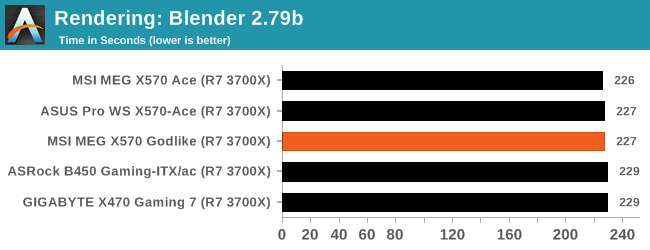
Streaming and Archival Video Transcoding - Handbrake 1.1.0
A popular open source tool, Handbrake is the anything-to-anything video conversion software that a number of people use as a reference point. The danger is always on version numbers and optimization, for example the latest versions of the software can take advantage of AVX-512 and OpenCL to accelerate certain types of transcoding and algorithms. The version we use here is a pure CPU play, with common transcoding variations.
We have split Handbrake up into several tests, using a Logitech C920 1080p60 native webcam recording (essentially a streamer recording), and convert them into two types of streaming formats and one for archival. The output settings used are:
- 720p60 at 6000 kbps constant bit rate, fast setting, high profile
- 1080p60 at 3500 kbps constant bit rate, faster setting, main profile
- 1080p60 HEVC at 3500 kbps variable bit rate, fast setting, main profile
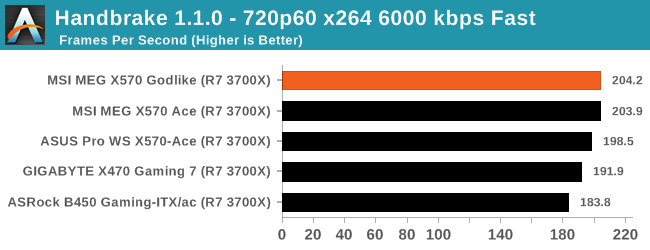
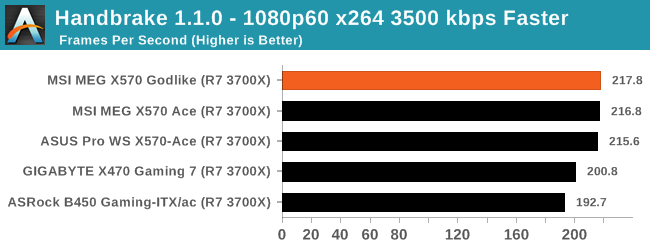
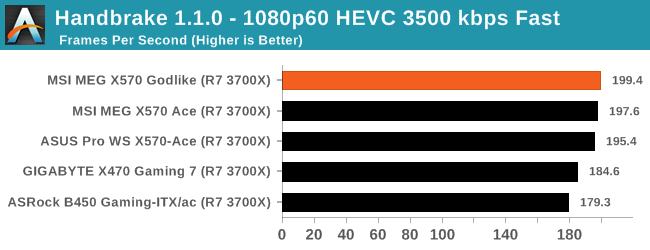
Rendering – POV-Ray 3.7.1: Ray Tracing - link
The Persistence of Vision Ray Tracer, or POV-Ray, is a freeware package for as the name suggests, ray tracing. It is a pure renderer, rather than modeling software, but the latest beta version contains a handy benchmark for stressing all processing threads on a platform. We have been using this test in motherboard reviews to test memory stability at various CPU speeds to good effect – if it passes the test, the IMC in the CPU is stable for a given CPU speed. As a CPU test, it runs for approximately 1-2 minutes on high-end platforms.
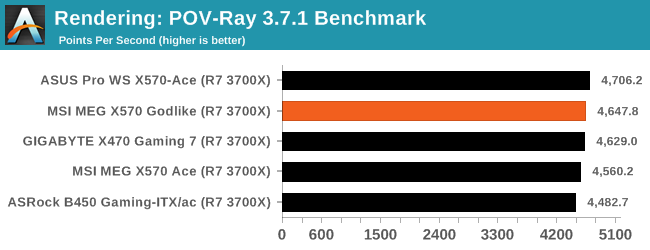
Compression – WinRAR 5.60b3: link
Our WinRAR test from 2013 is updated to the latest version of WinRAR at the start of 2014. We compress a set of 2867 files across 320 folders totaling 1.52 GB in size – 95% of these files are small typical website files, and the rest (90% of the size) are small 30-second 720p videos.
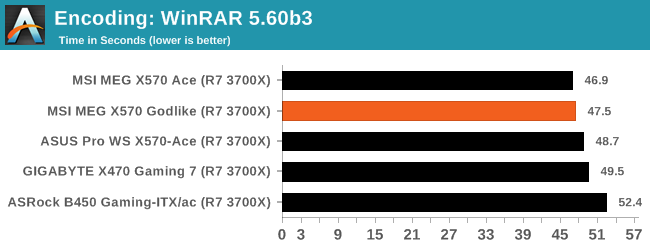
Synthetic – 7-Zip v1805: link
Out of our compression/decompression tool tests, 7-zip is the most requested and comes with a built-in benchmark. For our test suite, we’ve pulled the latest version of the software and we run the benchmark from the command line, reporting the compression, decompression, and a combined score.
It is noted in this benchmark that the latest multi-die processors have very bi-modal performance between compression and decompression, performing well in one and badly in the other. There are also discussions around how the Windows Scheduler is implementing every thread. As we get more results, it will be interesting to see how this plays out.
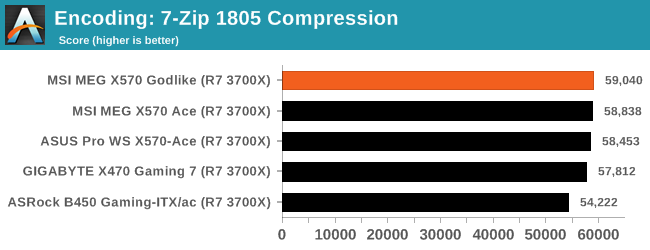
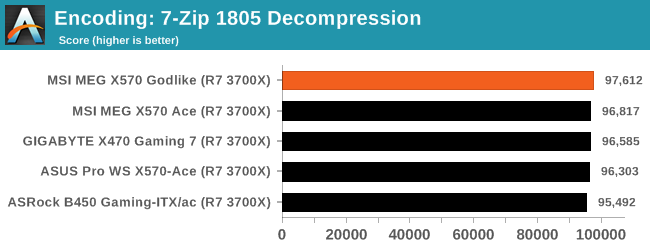
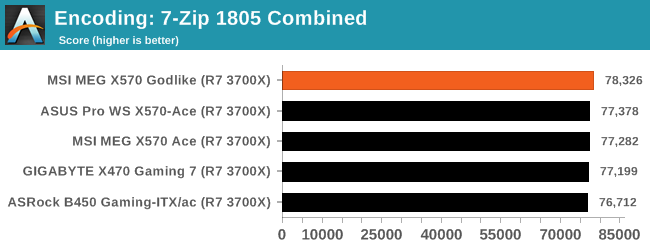
Point Calculations – 3D Movement Algorithm Test: link
3DPM is a self-penned benchmark, taking basic 3D movement algorithms used in Brownian Motion simulations and testing them for speed. High floating point performance, MHz, and IPC win in the single thread version, whereas the multithread version has to handle the threads and loves more cores. For a brief explanation of the platform agnostic coding behind this benchmark, see my forum post here.
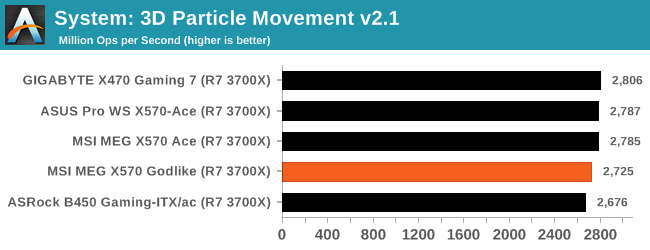
Neuron Simulation - DigiCortex v1.20: link
The newest benchmark in our suite is DigiCortex, a simulation of biologically plausible neural network circuits, and simulates activity of neurons and synapses. DigiCortex relies heavily on a mix of DRAM speed and computational throughput, indicating that systems which apply memory profiles properly should benefit and those that play fast and loose with overclocking settings might get some extra speed up. Results are taken during the steady-state period in a 32k neuron simulation and represented as a function of the ability to simulate in real time (1.000x equals real-time).
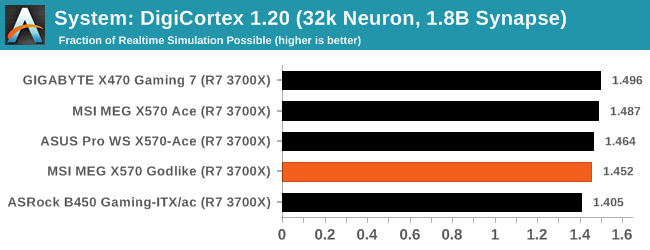










116 Comments
View All Comments
inighthawki - Wednesday, August 28, 2019 - link
Depends what you're doing. The 9900K is already, at stock, anywhere from 5-10% better single core perf than AMD, and also overclocks much higher. So if you're willing to accept the additional power draw and thermal output and your goal is raw single core performance, then absolutely.If you're working in highly multithreaded scenarios then the new 3900 and 3950 chips are clearly a much superior choice.
Most people who are willing to spend this much money and OC their parts are also generally not too concerned with future proofing their systems. If you can afford (and are willing to spend) $700 on a motherboard, it stands to reason that money is not much of a concern and they probably don't care about having to buy a new motherboard for a new socket in a couple years.
StevoLincolnite - Wednesday, August 28, 2019 - link
The 9900K is only an 8-core CPU though........ AMD can trounce it with it's higher core-count parts in multi-threaded scenarios.yetanotherhuman - Thursday, August 29, 2019 - link
He does say that, and you know he hasn't edited his post, because it's not possible :DQasar - Thursday, August 29, 2019 - link
but why buy a 9900k when you can get the 3900X for the same price, use less power over all, pretty much the same IPC, and get 4 more cores on top of that ?? who cares if the 9900K can hit 5gz?? clock speed isnt everything, the Athlon 64 proved that way back when vs the P4. besides.. what if ryzen 3000 series did hit the same clocks as intel does, that would make intel's cpus look even worseinighthawki - Thursday, August 29, 2019 - link
Because the 9900K still edges out the 3900 (and presumably the 3950) in single threaded performance. Some people care about that more than having more cores.AshlayW - Thursday, August 29, 2019 - link
wow 5-10%, now tell me where that actually matters over the disadvantages of owning the 9900K vs Ryzen 3000.Oliseo - Thursday, August 29, 2019 - link
"wow 5-10%, now tell me where that actually matters over the disadvantages of owning the 9900K vs Ryzen 3000. "Compiling software for one. By it's very nature it's single threaded.
Likewise DAWs also prefer high frequency high IPC cores rather than multiple lower specced lower frequencey cores.
When you route your channels through an effects bus, that effects bus is allocated a core. It CANNOT be spread over multiple threads.
Asking silly questions like that only demonstrate your own ignorance, where you highlight you don't actually know what it is you're talking about.
It's okay though, we were all young once. I'd recommend in future putting aside your brand loyality though. It's not worth your effort, they aren't loyal to you in any shape or form.
peevee - Friday, August 30, 2019 - link
"Compiling software for one. By it's very nature it's single threaded."Seriously? You obviously missed an option or two.
29a - Friday, August 30, 2019 - link
I'm not disagreeing with you but those last two paragraphs were unnecessary. You'll catch more flies with honey than vinegar.Bus3rr0r - Friday, August 30, 2019 - link
Maybe if you are writing single module programs in your mom's basement a singel core is fine.Most devleopment projects of even relatively small projects have hundreds with larger projects running into thousands of modules. It is not only common practise to compile modules in parallel butit woudl be ridiculous not to.
The reality is there are very few applications that cannot take advantage of multi-core.
You critise others for their ignorance while demonstrating your ignorance, remarkable.